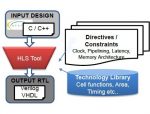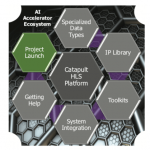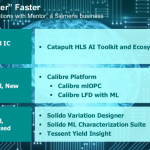As SoC complexities continue to expand to billions of transistors, the quest for higher levels of design automation also rises. This has led to the adoption of High-Level Synthesis (HLS), using design languages such as C++ and SystemC, which is more productive than traditional RTL design entry methods. In the RTL approach there… Read More
Tag: catapult
New Tool that Synthesizes Python to RTL for AI Neural Network Code
AI and ML techniques are popular topics, yet there are considerable challenges to those that want to design and build an AI accelerator for inferencing, as you need a team that understands how to model a neural network in a language like Python, turn that model into RTL, then verify that your RTL matches Python. Researchers from CERN,… Read More
HLS in a Stanford Edge ML Accelerator Design
I wrote recently about Siemens EDA’s philosophy on designing quality in from the outset, rather than trying to verify it in. The first step is moving up the level of abstraction for design. They mentioned the advantages of HLS in this respect and I refined that to “for DSP-centric applications”. A Stanford group recently presented… Read More
#57DAC – Panel Discussion of High Level Synthesis
Presenters took a trip down memory lane at DAC this year by having a panel discussion on HLS (High Level Synthesis) spanning from 1974 to 2020, and that time period aligns with when I first graduated from the University of Minnesota in 1978, starting chip design at Intel, then later transitioning into EDA companies by 1986. Marilyn… Read More
What a Difference an Architecture Makes: Optimizing AI for IoT
Last week Mentor hosted a virtual event on designing an AI accelerator with HLS, integrating it together with an Arm Corstone SSE-200 platform and characterizing/optimizing for performance and power. Though in some ways a recap of earlier presentations, there were some added insights in this session, particularly in characterizing… Read More
High-Level Synthesis and Open Source Software Algorithms
The DVCon conference and exhibition finished up in California just as the impact of the COVID-19 pandemic was ramping up in March, but at least they finished the conference by altering the schedule a bit. Umesh Sisodia, CEO at CircuitSutra Technologies presented at DVCON on the topic, Using High-Level Synthesis to Migrate Open… Read More
Konica Minolta Talks About High-Level Synthesis using C++
In the early days of chip design circa 1970’s the engineers would write logic equations, then manually reduce that logic using Karnaugh Maps. Next, we had the first generation of logic synthesis in the early 1980’s, which read in a gate-level netlist, performed logic reduction, then output a smaller gate-level netlist.… Read More
An AI Accelerator Ecosystem For High-Level Synthesis
AI accelerators as engines for object or speech recognition (among many possibilities), are becoming increasingly popular for inference in mobile and power-constrained applications. Today much of this inferencing runs largely in software on CPUs or GPUs thanks to the sheer size of the smartphone market, but that will shift… Read More
Mentor Extends AI Footprint
Mentor are stepping up their game in AI/ML. They already had a well-established start through the Solido acquisition in Variation Designer and the ML Characterization Suite, and through Tessent Yield Insight. They have also made progress in prior releases towards supporting design for ML accelerators using Catapult HLS. Now… Read More
MENTOR at DVCON 2019
The semiconductor conference season has started out strong and the premier verification gathering is coming up at the end of this month. SemiWiki bloggers, myself included, will be at the conference covering verification so you don’t have to. Verification is consuming more and more of the design cycle so I expect this event to … Read More











